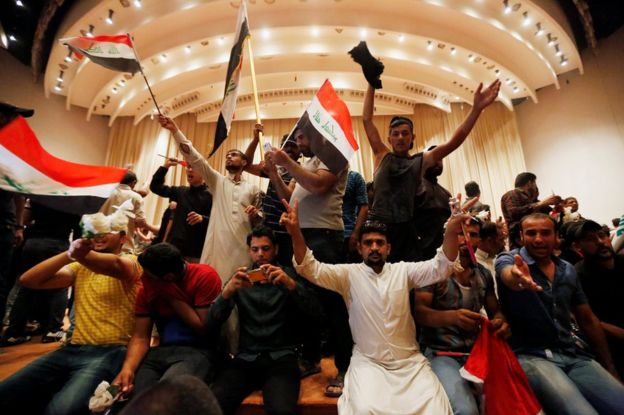Hundreds of Shia Muslim activists have stormed Iraq’s parliament in Baghdad, in protest against continuing deadlock in approving a new cabinet.
Supporters of cleric Moqtada Sadr broke through barricades of the fortified Green Zone for the first time, after MPs failed to convene for a vote.
A state of emergency was declared and security forces near the US embassy fired tear gas.
Protesters now seem to leaving the parliament but camping outside.
They are planning a sit-in in the Triumphal Arch area at the heart of the Green Zone, the BBC’s Ahmad Maher reports.
Mr Sadr wants Prime Minister Haider al-Abadi to commit to a plan to replace ministers with non-partisan technocrats.
Powerful parties in parliament have refused to approve the change for several weeks.
Earlier this week, hundreds of thousands of people marched towards the Green Zone, the most secure part of Baghdad that houses embassies and government buildings, to protest against the political deadlock.
Iraqi President Fuad Masum has called on the protesters to vacate parliament and politicians to enact the cabinet reshuffle.
A new protest outside the zone escalated after parliament again failed to reach a quorum on Saturday.
Groups marched on the district soon after the end of a televised appearance by Mr Sadr, although he did not call for the storming of parliament.
Image copyright Reuters Image caption The Shia protesters unfurled banners after storming parliament Image copyright AFP Image caption Delighted protesters cheered and posed for photos Image copyright Reuters Image caption Protesters toppled blast walls to reach the building Image copyright Reuters Image caption The demonstrators streamed through the Green Zone’s defences Image copyright AFP Image caption Stones were thrown at cars thought to be carrying MPs away
One protester, Ali Mohammed, said they were angry at the politicians’ failure to act.
“The people have come to the right place, to rule themselves,” he told Reuters news agency.
“The people are now staging a sit-in inside parliament. Our legitimate and only demand is to dismiss the government and replace it with an independent cabinet of technocrats.”
Meanwhile, the state of emergency declared does not feature a curfew.
According to the crisis escalates by BBC Middle East analyst Sebastian Usher
This is a major escalation of a political crisis that’s been brewing for months. The Iraqi prime minister set out an ambitious programme for reform last year – intended to foster a sense of political unity and accountability to help Iraq tackle the challenge of a failing economy and even more urgently, the battle against IS.
But he’s met fierce opposition at every turn in his attempt to cut off the political and financial corruption that’s enriched and empowered the elite for so long.
Moqtada Sadr has ostensibly supported him in this aim – having reinvented himself as the voice of the angry Iraqi people, fed up with the status quo.
But with the storming of parliament by his followers, there must now be a big question over whether he offers support to the beleaguered prime minister, or a challenge.
EU foreign affairs chief Federica Mogherini criticised the protesters’ actions, saying it was in the interests of the Iraqi people to restore order rapidly.
“It appears a deliberate disruption of the democratic process,” she said in a statement.
The protesters are reported to have begun ransacking parliament buildings. United Nations and embassy staff were on lockdown inside their compounds, Reuters reports.
Iraq’s system of sharing government jobs has long been criticised for promoting unqualified candidates and encouraging corruption.
Mr Abadi, who came to power in 2014, has promised to stamp out corruption and ease sectarian tensions, but he has failed to far to introduce a new technocratic cabinet.
A survey by the Pew Research Centre in 2011 found that 51% of Iraqi Muslims identified themselves as Shia, compared with 42% Sunni.
Elsewhere in Baghdad, a car bomb targeted a group of Shia Muslim pilgrims on Saturday, killing at least 21 people.
The Shia cleric and his militia group, the Mehdi Army, gained prominence after the US-led invasion of Iraq in 2003. galvanising anti-US sentiment.
Mr Sadr’s followers clashed repeatedly with US forces, whose withdrawal the cleric consistently demanded.
An arrest warrant was issued for Mr Sadr in 2004 in connection with the murder of a rival cleric.
His militia was also blamed for the torture and killing of thousands of Sunnis in the sectarian carnage of 2006 and 2007. Mr Sadr fled to Iran during that period.
In 2011, Mr Sadr returned from his self-imposed exile to Iraq, taking a more conciliatory tone and calling for Iraqi unity and peace.
Culled from bbc


